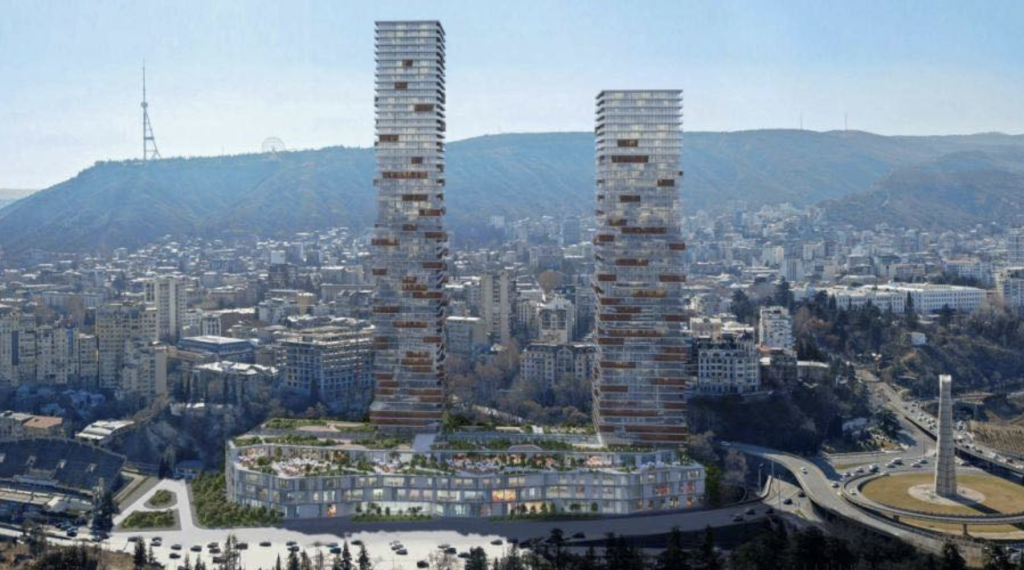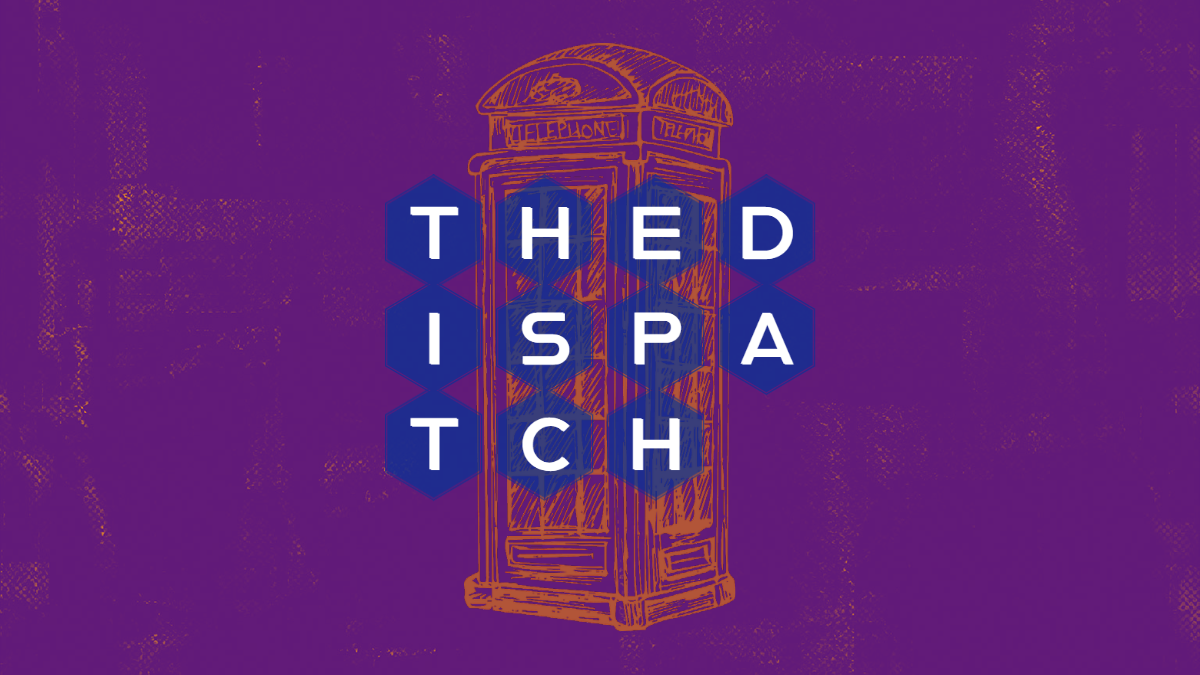Dispatch ’23 | Jan. 23-29: Babel
On UNM’s quest to save children and let itself be saved by children, and on the skyscrapers with an ambition to surpass heroes and – why not – reach God
There has been no shortage of self-sabotaging tendencies in the past week’s events in Georgia: a peace-preaching prime minister was seen touting kamikaze drones, while his party continues to take flak for shying away from helping Ukraine. Some strongmen want to erect skyscrapers in the wrong place and at the wrong time, while other strongmen are blamed for unrest in the biggest opposition party.
That party, the United National Movement, has rolled into an uneasy weekend of leadership elections, hoping to conclude their protracted identity crisis. It now looks likely, that despite the expectations the weekend may open up a new crisis or two. But not all was grim for UNM, as its forgotten standard-bearer went back to school to save the children – and perhaps charted the path to saving the party’s skin, too. Which path will UNM choose?
Here is Nini for The Dispatch, to figure out what drove this week’s chaos
UNM: Angels and Demons
This weekend, the United National Movement votes to elect a new chairman, following what has been tumultuous three months for the party. Four candidates – more or less prominent – clash, including the incumbent chairman, Nika Melia, and his main challenger, the more hardline-sounding Levan Khabeishvili. Held online on January 28-29 with up to 50,000 registered voters, these party elections feel like some bad karma – exposing every flaw that the party has been accused of, and some others for which the UNM has traditionally derided rivals.
This included accusations of takeover attempts by the party strongmen, who allegedly back Khabeishvili. There was polarizing rhetoric aplenty, and a mutual smear campaign flourishing into toxic headlines all over the media. As a recent blog by the Georgian Institute of Politics suggests, the party (like many others in Georgia) suffers from dysfunctional intra-party democracy and high levels of destructive internal polarization.
And of course, the urgency of the current state of Mikheil Saakashvili, UNM’s weightiest figure, does not help things. Neither does Saakashvili’s recent comment to Spiegel magazine saying Russian agents of influence may have had their hand in his controversial – an ill-fated – return to Georgia in 2021.
This chaos reaffirms the opposition’s political bankruptcy which has been frustrating its voters for a while. The country’s allegedly mightiest opposition force has been in such a bad place that its main rival, the ruling Georgian Dream party, started to look for alternative enemies to define itself against. It was picking fights right and left, anywhere from local intellectuals to CNN’s Christiane Amanpour.
But, on a positive note, useful ideas for the opposition may still be out there – just about five hour’s drive from the capital city.
Without making much noise in Tbilisi, the opposition-run Tsalenjikha municipality in Samegrelo decided to start a social policy experiment and provide free meals for first-graders in schools. The municipal council, also opposition-controlled, allotted a budget of GEL 200,000 ($75,000) to give each first-grader GEL 4 a day as food allowance, starting in February. The initiative reportedly comes from popular UNM mayor Gia Kharchilava, the man who made the impossible happen by becoming the only opposition candidate to win the mayoral races in the 2021 local elections (yet is conspicuously absent from the party leadership contest).
For those who forgot: that 2021 win gave birth to the media hype of an impending “Tsalenjikha miracle.” A number of opposition-minded politicians, educators, and businessmen headed there to project what has been a Midas-touch fantasy of any Georgian with leadership ambitions: to turn a place into a “hub” of all sorts. Those were men (yes, mostly men) with rich business experience, the kind who flaunt their expensive suits and believe in any miracle but the miracle of a free lunch.
And yet, ironically, it is the free lunch the miracle may hinge upon. The policy has its origins in the 2021 local elections, when the UNM, facing Tbilisi’s tense mayoral runoff, suddenly embraced the social problem. That problem had been raised in research circles and brought to the public by activist groups, saying that the majority of Georgian pupils experienced hunger in school and that the nutritional needs of many of them were not satisfied even as they returned home after lessons. The UNM promised to solve the problem, but the late campaign pivot was not sufficient for winning them the race. The popularity of the idea did, however, force panic among its rivals from the Georgian Dream, who started rolling out one social promise after another in response and made the campaign all about… “real problems,” as we love to call those kinds of issues here.
And then the inevitable happened: GD won and promptly abandoned its social stride. UNM leaders got quickly sidetracked by Misha thriller-turned-drama-turned-tragedy: instead of hungry children, they focused on the hunger strike of their jailed leader, and some joined him in a series of shortlived and misdirected hunger strikes. But the progressive activist group, Khma (voice), did not forget. They kept bringing up the issue on social media, TV, and by sticking posters all across the country. This might have brought the issue back to the political agenda, even if by a political force that is not usually well-liked by progressives.
But when the true miracle is about to happen – a self-governing body pushing unique policies to shift all politics, what happens in the capital? The party continues to fight its own demons, while its leaders focus on saving Misha, and the country — be it from Russia, the oligarch rule, or each other. Would this nightmarish leadership election reinforce the curse, or become a cure (if there is any) for the tormented party?
We don’t know, but since UNM is headed back to school, it may as well use the opportunity to unlearn some of its worst habits.
What else?
GOD COMPLEX A man’s desire to make his presence felt can be as infinite as the height of skyscrapers planned to be built near Tbilisi’s central Heroes Square. Last week’s social media fury was directed at the white elephant project which apparently can be traced to Bidzina Ivanishvili’s Kartu Foundation. A 60-story twin-skyscraper extravaganza is to add many more layers and trouble to the square which already hosts the city’s most maddening traffic jams, a road labyrinth, and dystopian pedestrian underground passes. And with their unusual heights, those new buildings have the ambition to steal the spotlight from anything around, if not to reach God above.

The project is yet to be approved by the municipality of Babylon, which has an infallible track record for entertaining Ivanishvili’s caprices. But few aside from Tbilisi mayor Kakha Kaladze find the idea of ain’t eyesore amusing (some twiterrati poetically called them the “daggers driven through the heart of town”). Dozens of organizations and individuals concerned with urban and environmental issues have already started the petition to kill off the monstrosity in its infancy. More radical voices say petitions are for weaklings and promise to bring the battle to the streets (while tapping away on their keyboards). Noticeably few think the battle can be won at the ballot boxes.
That’s all for this week. The Dispatch will be back next week with an update about the health and well-being of our inner demons, and monsters that haunt us – hopefully with a wry smile.
